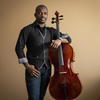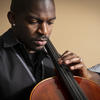Ajibola Rivers
School: Boyer College of Music and Dance
Degree: BM, music performance, 2016
Hometown: Lafayette Hill, Pennsylvania
When Ajibola Rivers, BYR ’16, decided to compose six solo cello suites, he knew what he was getting into. Suites are ordered sets of instrumental or orchestral pieces intended for a concert setting. Until recently, only Johann Sebastian Bach had written six suites for solo cello. The work would be arduous, lengthy and inevitably compared to Bach’s legendary collection. Rivers, however, had good mentors and good intentions, and he was ready to make history as the first Black and Native American composer to do it.







